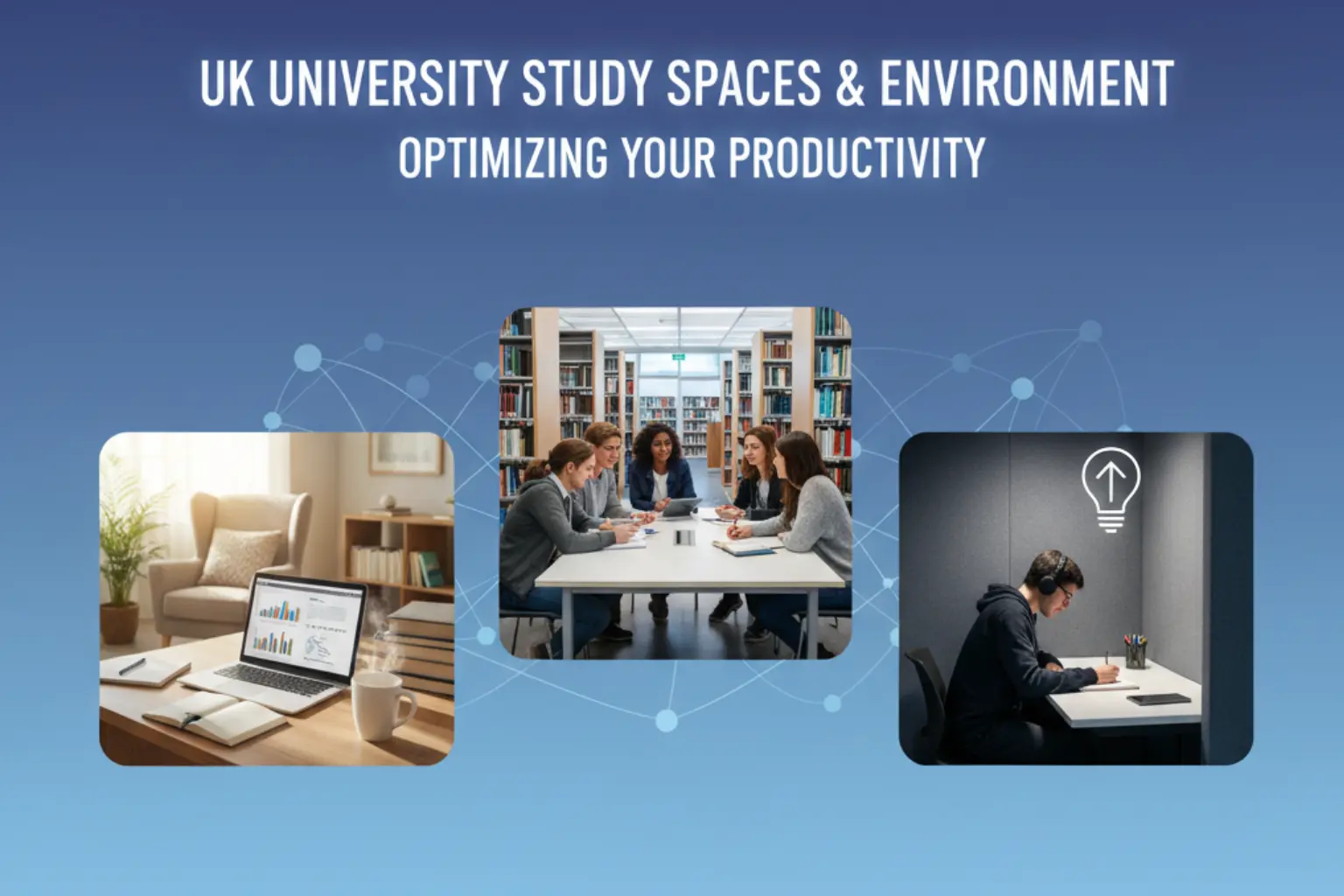×


Please fill all required fields
As a UK university student, your academic success isn't just decided by what you study, but where and how. The jump to university-level work demands deep focus, and your environment is your most powerful tool for achieving it. A cluttered desk, a noisy flat, or a distracting phone screen can be the difference between a First and a 2:2.
This guide moves beyond generic "find a library" advice. We'll explore the psychology of your study space, compare the best (and worst) environments for different tasks, and provide a practical toolkit for optimising your productivity.

Before you even open a book, your brain is taking cues from your surroundings. Understanding why your environment matters is the first step to controlling it.
Have you ever found it impossible to sleep in your office? The same principle applies to studying. Your brain creates powerful links between an environment and an activity. This is called context-dependent memory.
When you study in the same place you relax, watch TV, or sleep (especially your bed), your brain gets mixed signals. It doesn't know whether to power down for rest or power up for focus. By creating a dedicated "work" space—even if it's just one specific desk—you train your brain to enter "study mode" the moment you sit down, making focus and memory recall significantly easier.
Achieving a "flow state"—where you're fully immersed in your work—depends on tuning your physical environment.
Your digital space is just as important as your physical one. A constant barrage of notifications is the enemy of deep work.
Our service goes beyond basic writing. We specialise in specific referencing styles (Harvard, APA, OSCOLA) and subject complexities, ensuring your work meets the high expectations of your module leader.
Your university offers a variety of spaces. The key is matching the task to the location. You wouldn't draft a dissertation in a crowded SU bar.
Every university has one. Think of the grand, silent reading rooms at places like Manchester's John Rylands Library or London's Senate House. This is your high-focus sanctuary.
These are the buzzing, social hubs—group study rooms, common areas, or your favourite campus café.
For many students, this is the hardest environment to control, especially in a loud, shared house.

A clear desk leads to a clear mind. When your environment is organised, you remove friction and make it easier to start working.
You will spend hundreds of hours at your desk. If you're physically uncomfortable, your focus will be the first thing to break.
How much time have you wasted looking for "Essay_final_v2_final_FINAL.docx"? Digital organisation is non-negotiable.
Decision fatigue is the enemy of productivity. The "closed loop" system means having everything you need before you start. Don't give your brain an excuse to get up and get distracted.
Before you sit down, make sure you have:
When you don't have to break your concentration to find a pen, you're far more likely to stay in the flow.
Let's be realistic. Sometimes, the "perfect" study environment is impossible.
Your housemates are throwing a party. The library is closed. You're trying to write a 3,000-word essay on a shaky train table, or you're balancing your laptop at the family kitchen table during a chaotic holiday.
You can't control everything. But you can control the final quality of your work.
When your environment is distracting, stressful, or chaotic, your work suffers. You rush. You make simple mistakes. Your focus is split, so you miss that one crucial reference, make a grammatical error, or misread the formatting guidelines.
These small, technical errors are what separate a high grade from a low one. They are the first things a marker notices, and they signal a lack of care—even if the ideas in your essay are brilliant.
This is where you work smart. You've done the hard part—the research, the critical thinking, the drafting (the 90%). But you're too stressed, tired, or distracted to guarantee the final 10%—the technical perfection.
When you can't secure the perfect, silent environment needed for meticulous proofreading, outsource that focus. Our service acts as your "silent library zone." We are the experts who step in to handle the flawless technical execution—the grammar, referencing, formatting, and clarity—that requires intense,-undisturbed concentration.
You focus on your core ideas. We make sure they are presented perfectly.
Don't let a poor study environment sabotage your grade. You've done the hard work. Let us provide the final, professional polish that secures the mark you deserve.
Experiment for one week in different environments—library, café, home, and outdoors. Track how many pages or tasks you complete per hour and how focused you feel. The space where you lose track of time (in a good way) is your best-fit environment.
Scout alternative quiet areas early—departmental study rooms, postgraduate lounges, or even local public libraries. Many UK campuses also have “overflow study zones” announced via email or the university app during busy weeks.
Yes. Cognitive research suggests that varying your study location slightly (like alternating between two spots) helps with memory recall because your brain associates learning with multiple environmental cues.
Use vertical storage (shelves or wall organisers), a foldable desk, and wireless peripherals to maximise space. Keep the area visually simple—minimal clutter equals minimal distraction.
Invest in a bright LED desk lamp with adjustable tones (around £15–£25), add a cushion or lumbar pillow for your chair, and place a small plant near your desk to reduce stress and eye fatigue.
Physically change your environment. Move to a new seat, open a window, or stand up to stretch. Small environmental shifts can “reset” your mental state faster than sheer willpower.